It’s Shark vs. Roomba in the ultimate side-by-side robot vacuum battle. Which is best for your home? Let’s find out now!

While Roomba primarily focuses on robot vacuums, Shark makes a much wider range of vacuuming types, producing upright, stick, canister, and handheld models as well.
In this comparison, we’re going to focus exclusively on the robot lineup from Shark vs. Roomba.
High-End Models
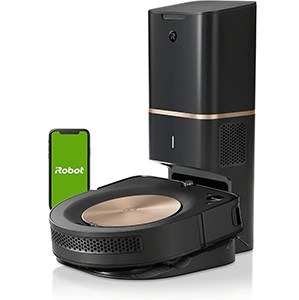
Roomba S9+
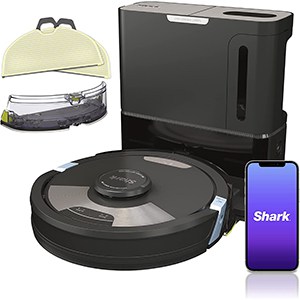
Shark AI 2-in-1 Ultra
Mid-Range Models
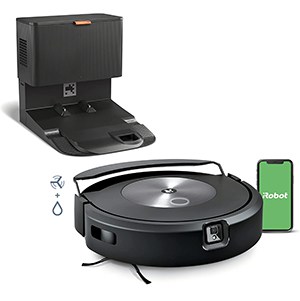
Roomba Combo J7+
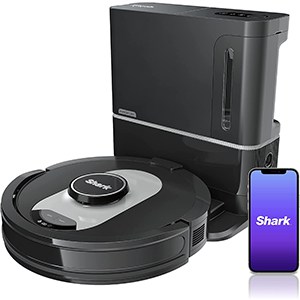
Shark AI Ultra
Budget Models
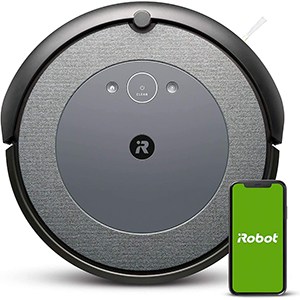
Roomba i3 EVO
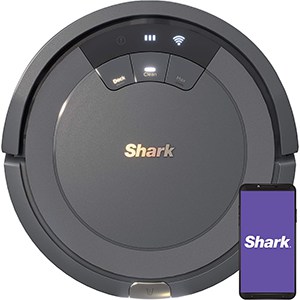
Shark ION AV753
Differences between Shark & Roomba
iRobot Roomba is more established as a robot vacuum manufacturer vs. Shark. Shark’s ION and RV models offer more basic robot vacuums compared to Roomba’s full model lineup. That said, the Shark AI & IQ with its self-emptying dust bin is a notable upgrade.
Comparing Shark to Roomba’s higher-end models there is a difference. The Roomba S9+, j7+, Combo j7+, i7+, i3+ EVO, e5, and other high-end models offer some more unique features compared to most Shark robots.
Shark Robot Vacuums
Shark offers a wide selection of vacuum types, ranging from uprights and stick vacuums to portable handhelds and tag-along canisters. To keep up with the ever-changing vacuum market, they also now manufacture robot vacuums.
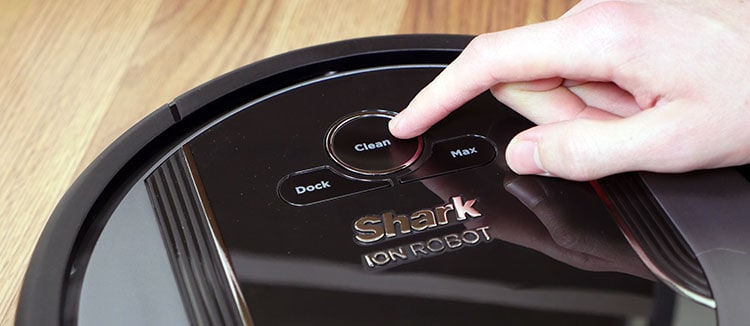
The current lineup of robot vacuums in the Shark AI, IQ, and ION series includes:
- Shark AI – Includes the Shark AI Ultra 2-in-1 Self-Empty XL, Shark RV2620WD (same as Ultra 2-in-1 without the base), Shark AI Ultra Self-Empty XL, Shark AV2511AE, Shark AV2501S, and Shark AV2501AE (all similar versions to the AI Ultra).
- Shark IQ – Includes the Shark IQ RV1001AE, AV1010AE (similar model), Shark IQ R101, Shark IQ AV992, Shark IQ AV993 (these are the same robot as the main Shark IQ, but don’t include the self-empty base), and Shark IQ RV2410WD (comes with mop attachment).
- Shark ION 800 Series – Includes the Shark ION RV871 (newer version of the Shark ION R87) as well as some older versions of similar vacuums, like the Shark ION R85.
- Shark ION 700 Series – Includes the Shark ION RV761 (aka: ION R76; which is the same as R87, just with a smaller dust bin), ION AV753, AV752, and AV751
- Shark EZ Series – Shark EZ AV911S and RV912S both have auto-empty bases
Shark has made a number of changes to the naming of these vacuums, which can sometimes make for tricky comparisons.
To help make things a little more simple, Shark has 4 different series of vacuums. Their newest is the AI series, which includes their latest and greatest features.
Next comes the IQ, which has now absorbed some of the previous ION 900 series robot vacuums.
The ION models include a variety of vacuums that include numbers and letters. Below shows the progression of one ION model in all three naming styles:
- Shark ION + 2 digit number (ex: Shark ION 75)
- Shark ION + 3 digit number (ex: Shark ION R750)
- Shark ION + letter/s + 3 digit number (ex: Shark ION AV751)
Generally, the 2 digital number models (ex: ION 85, have been phased out and replaced with 3 digit models like the AV751 or the RV871). Despite the fact that the model names are often different, they are typically extremely (if not exactly) identical to other models.
For example, Shark ION 75 and R750 are exactly the same. And the AV751 is extremely similar to the 75 and R750. This methodology also holds true with other Shark robot vacuums.
The constant changes of the naming style is a bit confusing, but hopefully, this rundown helps to clear up the fact that these sub-names are basically the same vacuum older models, but with a new name.
Roomba Robot Vacuums
iRobot is the company behind the Roomba name. iRobot specializes in two kinds of robots, including the:
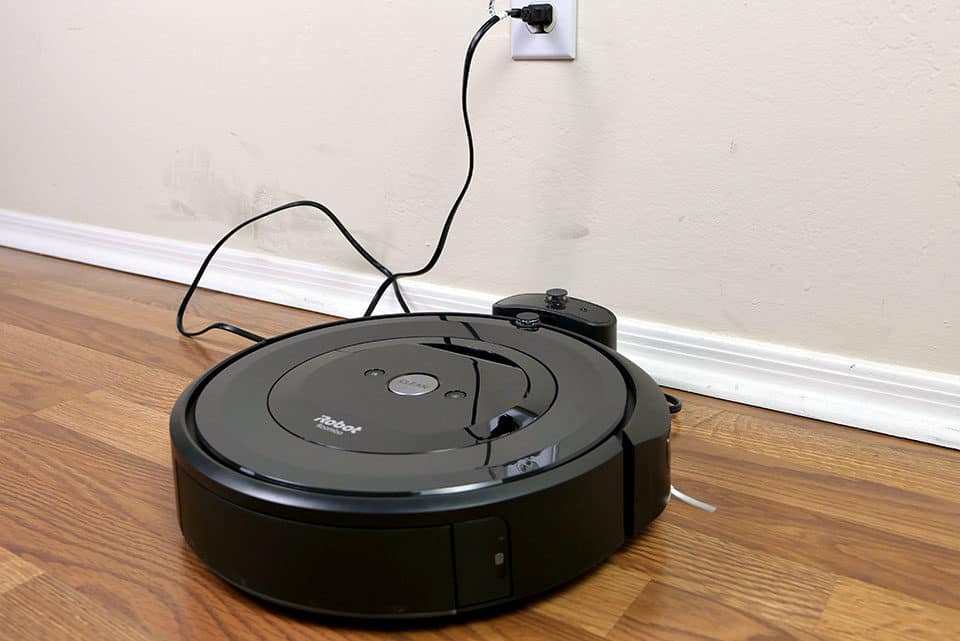
In the Roomba vs. Shark battle, Roomba will be the main contender.
Roomba robot vacuums come in a variety of series types and models, but for the sake of this review, we will primarily be looking at the following:
- S Series: Roomba S9+ and Roomba S9
- J Series: Roomba j7+, Roomba j7, Roomba Combo j7, Roomba Combo j7+
- i Series: Roomba i7+, Roomba i7, Roomba i3+ EVO, Roomba i3 EVO,
- e Series: Roomba e5
There are a number of 800 and 600 series models available (900 and 700 series are mostly discontinued). However, they are older and you get much better performance with the e and i series for about the same price.
- 800 Series: Roomba 890
- 600 Series: Roomba 690 / 692 / 694 and Roomba 675
Shark vs. Roomba Comparison Chart
Best Overall

Roomba S9+
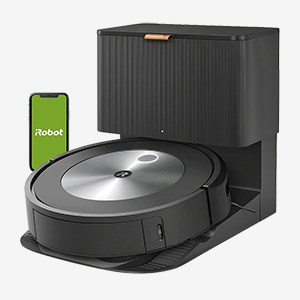
Roomba j7+
Best Vacuum Mop combo

Roomba j7+ Combo
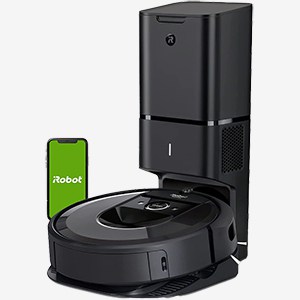
Roomba i7+
Good Value

Roomba i3+ EVO
Good Value
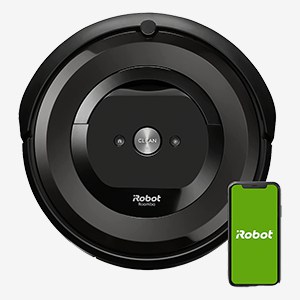
Roomba e5
Best SHark

Shark AI Ultra 2-in-1
2nd Best SHark
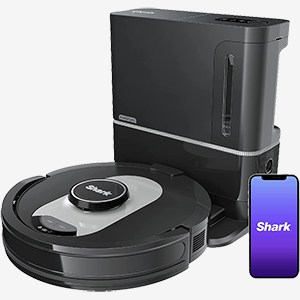
Shark AI Ultra
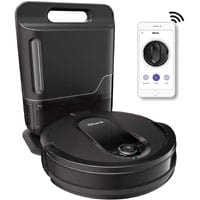
Shark IQ
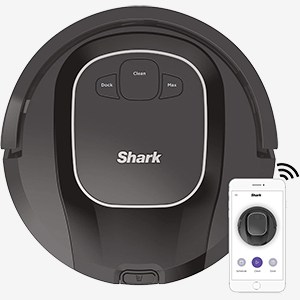
Shark RV871
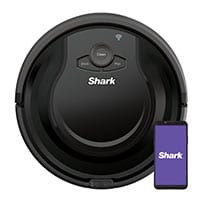
Shark AV751
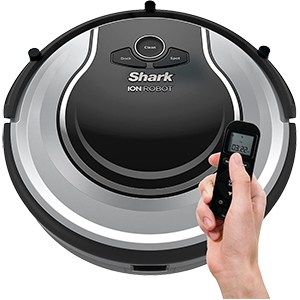
Shark R72/RV720
In the table below you’ll find more detailed specs and features on the most popular Roomba vs. Shark robot models.
| Roomba S9+ | Roomba Combo j7+ | Roomba j7+ | Roomba i7+ | Roomba i3+ | Roomba e5 | Roomba 890 | Roomba 690 | Roomba 675 | Roomba 614 | Shark AI Ultra 2-in-1 | Shark AI Ultra | Shark R100AE | Shark RV871 | Shark AV751 | Shark ION R75 | Shark ION R72 | |
|---|---|---|---|---|---|---|---|---|---|---|---|---|---|---|---|---|---|
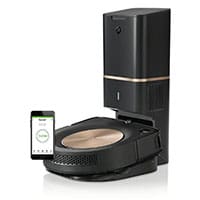 |  | 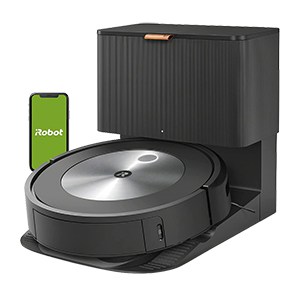 | 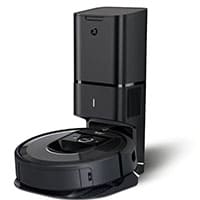 | 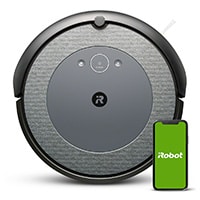 | 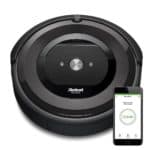 |  | 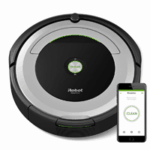 | 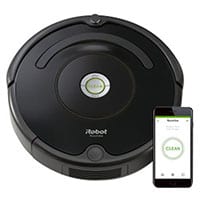 |  |  |  |  |  | 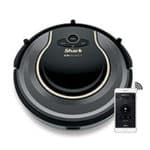 | 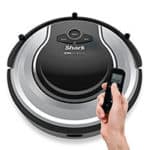 | ||
| Battery | 1,800 mAh | Lithium Ion | Lithium Ion | 1,800 mAh | 1,800 mAh | 1,800 mAh | 1,800 mAh | 1,800 mAh | 1,800 mAh | 1,800 mAh | Lithium Ion | Lithium Ion | 2,600 mAh | 2,600 mAh | |||
| Run Time | ~75 min. | Unknown | Unknown | ~90 min. | ~75 min. | ~90 min. | ~60 min. | ~60 min. | ~90 min. | ~60 min. | ~120 min. | ~120 min. | ~90 min. | ~90 min. | ~60 min. | ~60 min. | |
| Dust Bin Capacity | 0.5 L / Self-Emptying | Unknown / Self-Emptying | Unknown / Self-Emptying | 0.5 L / Self-Emptying | 0.5 L / Self-Emptying | 0.5 L | 0.3 L | 0.3 L | 0.3 L | 0.3 L | Unknown | Unknown | 0.16 L | 0.56 L | 0.6 L | 0.4 L | |
| Diameter | 12.25" | 13.3" | 13.3" | 13.3" | 13.3" | 13.3" | 13.9" | 13" | 13.4" | 13.9" | 14.9" | 14.9" | 12.6" | 12.8" | 12.8" | 12.6" | 12.6" |
| Height | 3.5" | 3.4" | 3.4" | 3.6" | 3.6" | 3.6" | 3.6" | 3.6" | 3.6" | 3.6" | 5.7" | 5.7" | 3.5" | 3.5" | 3.6" | 2.6" | 2.6" |
| Weight | 8.15 lbs. | 7.4 lbs. | 7.5 lbs. | 7.4 lbs. | 7.4 lbs. | 7.2 lbs. | 8.4 lbs. | 7.8 lbs. | 7.8 lbs. | 7.9 lbs. | 14.5 lbs. | 14.5 lbs. | 6.92 lbs. | 5.7 lbs. | 5.5 lbs. | 5.5 lbs. | 5.5 lbs. |
| Spinning Side Brush | 2 | 1 | 1 | 1 | 1 | 1 | 1 | 1 | 0 | 1 | 1 | 1 | 2 | 2 | 2 | 2 | 2 |
| Brushroll | Dual, Rubberized | Dual, Rubberized | Dual, Rubberized | Dual, Rubberized | Dual, Rubberized | Dual, Rubberized | Dual, Rubberized | Single, Bristle | Dual, Bristle + Composite | Single, Bristle | Single, Finned | Single, Finned | Single, Rubberized | Single, Rubberized | Single, Bristle | Single, Bristle | Single, Bristle |
| Cleaning Performance | 99% | 96% | 96% | 99% | 99% | 99% | 92% | 94% | 94% | 95% | 98% | 87% | 94% | ||||
| Self-Charging | Yes | Yes | Yes | Yes | Yes | Yes | Yes | Yes | Yes | Yes | Yes | Yes | Yes | Yes | Yes | Yes | Yes |
| Scheduling | Yes | Yes | Yes | Yes | Yes | Yes | Yes | Yes | Yes | No | Yes | Yes | Yes | Yes | Yes | Yes | Yes |
| High Performance Filter | Yes | Yes | Yes | Yes | Yes | Yes | Yes | No | Yes | No | Yes | Yes | Yes | Yes | Yes | Yes | Yes |
| Full Bin Indicator | Yes | Yes | Yes | Yes | Yes | Yes | Yes | No | No | No | Yes | Yes | Yes | Yes | Yes | No | No |
| Recharge & Resume | Yes | Yes | Yes | Yes | Yes | No | No | No | No | No | Yes | Yes | Yes | Yes | Yes | No | No |
| Cleaning Reports | Yes | Yes | Yes | Yes | Yes | No | No | No | No | No | Yes | Yes | Yes | Yes | No | No | No |
| Wireless Control | Wifi-Enabled | Wifi-Enabled | Wifi-Enabled | Wifi-Enabled | Wifi-Enabled | Wifi-Enabled | Wifi-Enabled | Wifi-Enabled | Wifi-Enabled | None | Wifi-Enabled | Wifi-Enabled | Wifi-Enabled | Wifi-Enabled | Wifi-Enabled | Wifi-Enabled | Remote Control |
| Boundaries | Digital Markers (in-app) | Digital Markers (in-app) | Digital Markers (in-app) | Digital Markers (in-app); Virtual Barrier (1) | Digital Markers (in-app) | Virtual Barrier (1) | Virtual Barrier (1) | Virtual Barrier (1) | None | None | Digital Markers (in-app) | Digital Markers (in-app) | Boundary Strips (9') | Boundary Strips (9') | Boundary Strips (9') | Boundary Strips (9') | Boundary Strips (9') |
| Review | Read Review | Read Review | Read Review | Read Review | Read Review | Read Review | Read Review | Read Review | Read Review | Read Review | Read Review | Read Review | Read Review | Read Review | Read Review | ||
| Price | Check Price | Check Price | Check Price | Check Price | Check Price | Check Price | Check Price | Check Price | Check Price | Check Price | Check Price | Check Price | Check Price | Check Price | Check Price | Check Price | Check Price |
Shark AI vs. Shark IQ vs. Roomba S9+ vs. Roomba j7+ vs. Roomba i7+ vs. Roomba i3 EVO vs. Roomba e5
One of the most common questions we have seen from our readers is the difference between the most high-end models from Shark and Roomba.
Specifically, the Shark AI vs. IQ vs. Roomba S9+ vs. j7+ vs. i7+ vs. i3+ EVO vs. e5.
Below we’re going to cover these 8 models side-by-side:

Roomba S9+ Robot

Shark AI Ultra 2-in-1

Roomba j7+ Combo

Shark AI Ultra

Roomba j7+
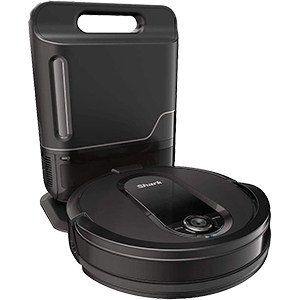
Shark IQ
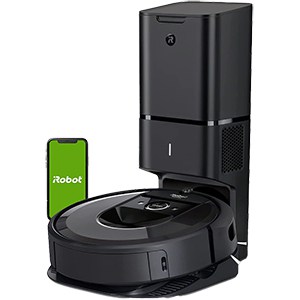
Roomba i7+

Roomba i3+ EVO

Roomba e5
Similarities
- Mapping – Shark AI’s, IQ, Roomba S9+, j7+,and i7+ all have advanced digital mapping. They all create a map you can access via your smartphone. From there you can setup scheduling, room cleanings, view history, and more. Roomba i3+ EVO also has a map, but it doesn’t save the map between cleanings and you can’t use that map to set up zones. Even more basic, the Roomba e5 does not have digital mapping capabilities at all.
- Run Time – The run time for all these robots is fairly similar. The Shark AI have the longest at 120 minutes, with the Roomba e5 in second. Companies don’t always choose to disclose their run time information, but in testing, we found the Roomba j7+ and Shark IQ to be about average. All of the vacuums listed here (Shark or Roomba) have Recharge & Resume with the one exception being the Roomba e5.
Differences
- Cleaning Performance – While Shark was behind Roomba previously, that isn’t the case anymore. The Shark AI are equal to the latest j7+ from Roomba. That said, the S9+, i7+, i3+ EVO, and e5 are still king with 99% debris removal, while the Shark IQ lags behind at 87%. That said 87% is still the vast majority of debris, but when you are looking at the best, 99% surpasses 87%.
- Recharge and Resume – This feature lets the robot go recharge itself and then resume where it left off, in the event its not able to finish a clean job before the battery runs out. Roomba j7+, S9+, i7+, i3+ EVO, Shark AI, & IQ have it, Roomba e5 does not.
- Self-Empty Bins – Roomba j7+, Roomba S9+, Roomba i7+, Roomba i3+ EVO, Shark AI, and Shark IQ all have a self emptying dust bin. The Roomba e5 and the standard Roomba i3 EVO do not have this feature. This is a major convenience factor and could be a big bonus if this is a feature you’re specifically looking for.
- Mopping Features – Both the Shark AI Ultra 2-in-1 and the Roomba Combo j7+ having mopping capabilities. While you have to physically exchange the mop attachment on the Shark, the Combo j7+ can automatically lower a mopping attachment for more dynamic cleaning.
- Bag vs. Bagless – Roomba j7+, S9+, i7+, and i3+ EVO use a bagged design within the Clean Base charging station. As these bags get full you’ll need to replace them. The Shark AI & IQ uses a bagless design that you can just empty. There are pros and cons to each design. More generally speaking, bags are more hygienic, but cost more over the life of the unit, while bagless is more convenient and less expensive.
- Price – Roomba S9+ and j7+ are the most expensive out of the group, with the Shark AI and i7+ not too far behind. On the more budget-friendly side of things, we have the Shark IQ, Roomba i3+ EVO, and e5.
Bottom Line
So then…we’ve seen all the data, what’s the real bottom line on what’s better or worse?
Roomba S9+
The Roomba S9+ is the most advanced iRobot robot vacuum currently on the market.
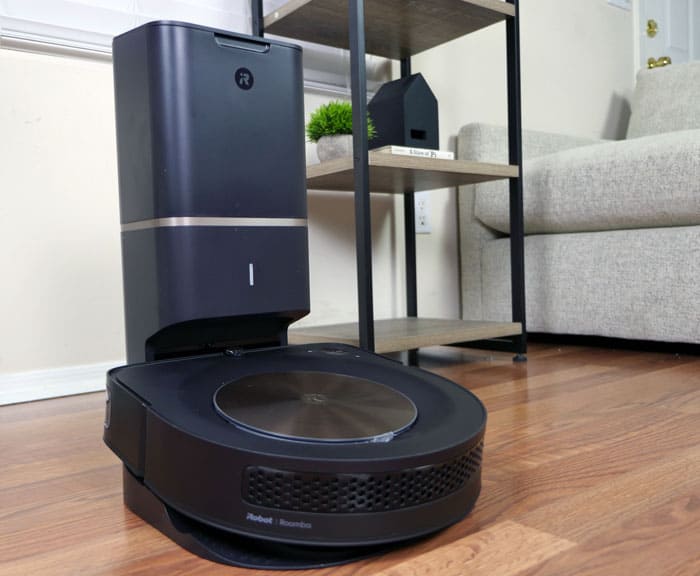
It’s most notable feature is the clean base, which allows the S9+ to empty its own dust bin into the base. From there, you’ll just need to replace the bag every month or two (depending on use).
The S9+ offers advanced digital mapping, excellent navigation, digital keep out zones, scheduling, incredible suction, and more. It’s easily the most advanced and high-end robot vacuum we’ve tested to date.
- Dimensions: 12.25″ x 3.5″ H
- Run Time: 75 minutes (is able to recharge and resume)
- Weight: 8.15 lbs.
Pros
- Flat front body style allows the robot to clean better in corners and along edges
- Incredible suction power (40 times more suction compared to Roomba 600 series)
- Self-empty dust bin
Cons
- One of the most expensive robots on the market
Best of the Best

Roomba S9+
It’s the most expensive, but it’s objectively the best performer with the most features. Bottom line, it’s arguably the best robot currently being sold anywhere. It has got convenience, digital mapping, keep out zones, and extraordinary performance. If you want the best, get the S9+.
Shark AI
Improving on their own design and providing strong competition to Roomba, the Shark AI is an excellent robot vacuum. It comes in three versions, the standard, ultra, and 2-in-1, which provide progressively more usability features.
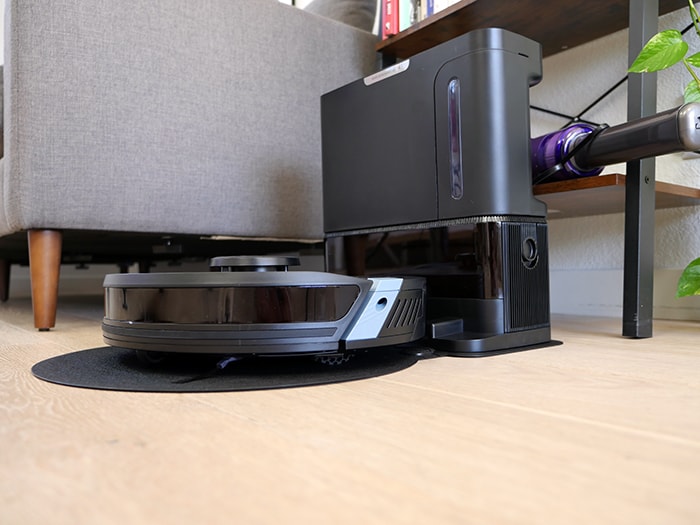
They had fantastic debris removal in our tests, removing debris, hair, and pet hair. Plus the mop addition in our 2-in-1, while slightly cumbersome, performed well.
The Shark AI navigates well with LiDAR, has a bagless auto-empty base, and app for map and device management.
- Dimensions: 14.9″ x 5.7″ H
- Run Time: 120 minutes (is able to recharge and resume)
- Weight: 14.5 lbs.
Pros
- Bagless base station
- Excellent cleaning performance, especially on hardwood with a 99.8% debris removal
- Navigated well and cleaned the full space
Cons
- Failed to avoid 3 / 4 objects in our test
- Struggled with long hair and pet fur
Solid Competition Fantastic Performance

Shark AI
With either the 2-in-1, the Ultra, or the standard versions, the Shark AI is a strong competitor to Roomba’s vacuums. It offers fantastic performance with mopping functionality options. Plus a bagless auto-empty base and LiDAR sensor for navigation. It comes in 3 different versions that progressively add features to enhance usability.
Shark IQ
While not the latest Shark robot vacuum, the Shark IQ is a great robot and has a self-emptying dust bin, like the S9+ and i+ Series Roomba.
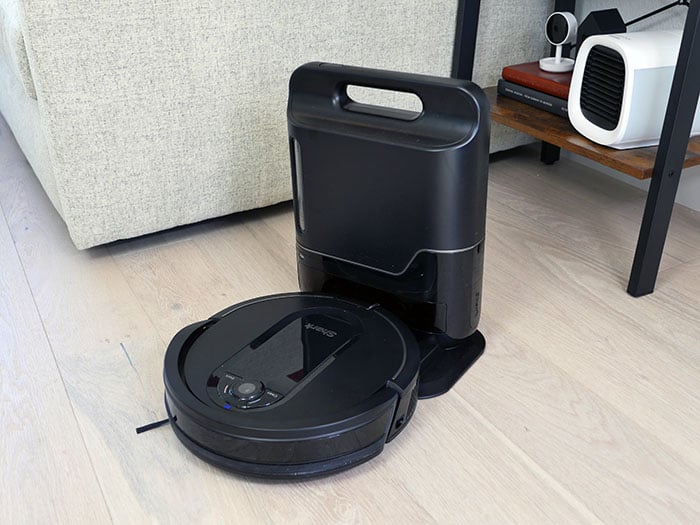
The Shark IQ digitally maps your home, can be controlled over your smartphone, and has a “Room Select” feature that allows you to clean a specific room. It doesn’t have the raw cleaning power of the high-end Roomba, but it was still a pretty good cleaner in our tests.
- Dimensions: 12.6″ x 3.5″ H
- Run Time: Not specified
- Weight: 5.87 lbs.
Pros
- Can empty its own dust bin
- Relatively low price compared to other robots that empty their own bins
- Digital mapping
Cons
- Cleaning performance was good, not great
- Large debris has the ability to clog the bin (and did so during our tests)
Self-empty on a budget

Shark IQ
So where does that leave the Shark IQ? In my view, Shark IQ is the robot you get if you want a self-emptying dust bin for the lowest price point. The Shark IQ lacks in a number of areas, including cleaning performance, dust bin size, and zoned cleaning. That said, it’s performance wasn’t bad in our tests and it does have the self empty dust bin. If that feature is important and you want the cheapest option, this is it.
Roomba Combo j7+
While the Roomba S9+ may be our top recommendation, it’s hard to argue with the usability improvements of the Roomba Combo j7+.

It offers fantastic debris removal of 96%, managed pet hair well, and most importantly comes with a adjustable mop. This mop can raise or lower depending on the detected floor type to enable simultaneous vacuuming and mopping.
While you’ll need to fill the water tank yourself, the auto-empty base will take care of the debris. Plus, you get obstacle avoidance to improve navigation, especially on more cluttered floors.
- Dimensions: 13.3″ x 3.4″ H
- Run Time: Unknown (is able to recharge and resume)
- Weight: 7.35 lbs.
Pros
- Retractable mopping pad
- Excellent cleaning performance with 96.4% debris removal rate
- Excellent obstacle avoidance
- Auto empty charging station
Cons
- Charging station doesn’t wash, fill, or dry the device
- Long hair easily tangles around edge spinning brush
2-in-1 lift-away Robot Vacuum & Mop

Roomba Combo j7+
Another expensive option, but by far the most user-friendly Roomba yet. It adds 2-in-1 mopping functionality with a mop that lifts / lowers automatically, obstacle avoidance, and all the same features Roomba previously included. On top of that it still has fantastic performance removing 96.4% of all debris.
Roomba j7+
The Roomba j7+ is similar in many ways to the Combo j7+, but lacks the mopping functionality. That said, it is still a fantastic robot vacuum.

It removed 96.4% of all debris in our tests, avoided hair tangles, and weaved through objects as it cleaned. In addition, it navigates well never getting stuck and always returning to base.
Usability is where the j7+ shines brightest. The auto-empty base, recharge and resume features, and robust app functionality makes this robot one you can turn on and let it clean.
- Dimensions: 13.3″ x 3.4″ H
- Run Time: Unknown (is able to recharge and resume)
- Weight: 7.49 lbs.
Pros
- Solid cleaning performance, removed 96.4% of total debris in our tests
- Advanced navigation that can detect and avoid obstacles in real-time (avoided all 3 obstacles we tested against)
- Self-emptying dust bin that can store up to 60 loads of debris
- Provides cleaning time estimates and reports
- Can adjust its cleaning schedule based on your preferences
Cons
- Higher price tag
- Not as much suction as the Roomba S9+
- Only vacuums, doesn’t mop
Fantastic performer with Obstacle Avoidance

Roomba j7+
If the 2-in-1 mop is too much, the Roomba j7+ offers all the same great usability without mopping functionality. This is the first vacuum from Roomba to include an RGB camera and obstacle avoidance technology. Plus the auto-empty base and excellent cleaning performance are important factors as well. It has 96% debris removal rate across all floor and debris types.
Roomba i7+
The Roomba i7+ is one of the most advanced robot vacuums on the market today. It can easily connect to your smartphone for remote control and has the best cleaning performance in a robot vacuum that we’ve tested to date.
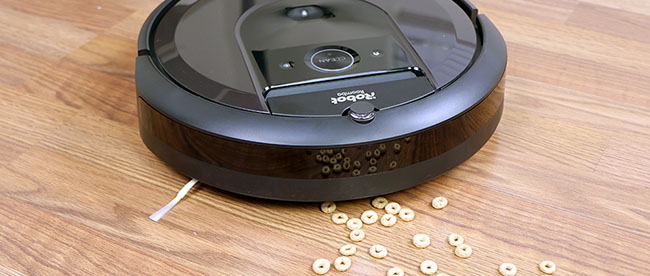
For an added bonus, you can get the Roomba i7+, which includes a self-emptying dust bin that deposits up to 30 loads of debris into a bagged compartment of the charging station.
- Dimensions: 13.3″ diameter x 3.6″ H
- Run Time: ~90 minutes
- Weight: 7.4 pounds
Pros
- Long run time and offers the Recharge and Resume feature for easy charging in the middle of a cleaning cycle
- Self-emptying dustbin when you opt for the i7+ model
- Extremely impressive cleaning performance on all floor types
Cons
- Very expensive compared to other robot vacuums, especially the Shark lineup
- The i7+ model will require replacement dust bags, which is an additional maintenance cost.
Fantastic High-end Performance & Features

Roomba i7+
The Roomba i7+ has an advanced “home base” that doubles as a charging station and a self-emptying dustbin where it can store up to 30 loads of debris from the i7+ cleaning cycles. Additionally, its cleaning performance and usability (via app control and advanced mapping) easily make the i7+ one of the best robot vacuums on the market.
Roomba i3+ EVO
The Roomba i3+ EVO strikes a nice balance between performance and price. It has the same self-emptying dust bin like on the S9+ and i7+ as well as wifi-connectivity and app control. Cleaning performance is also nearly flawless.
The i3+ EVO takes a bit of a more basic approach to mapping—provides maps in the app, but lacks the ability to set up zoned cleaning so they’re not full featured smart maps.
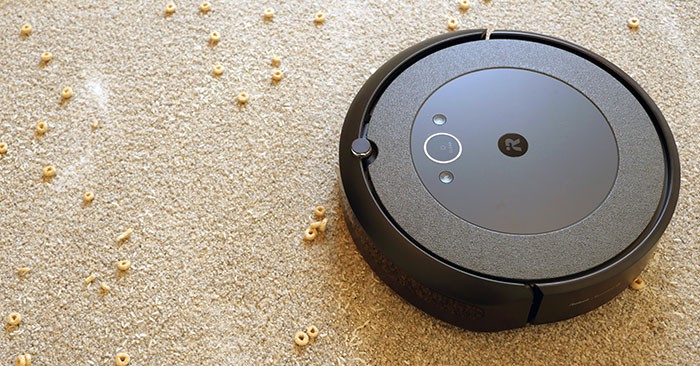
If you want the features of the i3 and don’t necessarily need the self-emptying dust bin, you can purchase the i3 EVO with the standard dust bin and save yourself some cash.
The Clean Base self-emptying system can always be purchased later if you decide you really want it. The e5 is not compatible with the Clean Base.
- Dimensions: 13.3″ diameter x 3.6″ H
- Run Time: ~75 minutes
- Weight: 7.4 pounds
Pros
- Self-emptying dust bin with the i3+ EVO model (not on the standard i3)
- Great cleaning performance on all floor types
- Offers digital mapping (not “smart maps”)
Cons
- Still pricier than the more basic Roombas, like the 675 or the e5
Great Value With Self-Emptying Dust Bin

Roomba i3+ EVO
The Roomba i3+ EVO takes the advanced capability of the self-emptying dust bin and pairs it with a more affordable robot vacuum, for a value-packed blend of performance, usability, and price. It has digital mapping, smartphone integration, and great cleaning performance. You miss out on the zoned cleaning and physical virtual walls, but these may be pretty minor issues to most users.
Roomba e5
The Roomba e5 is a part of the Roomba e Series, but offers a budget alternative to other high-end models. This vacuum still has a long 90-minute run time, scheduled cleanings, wifi connectivity, and excellent cleaning performance.
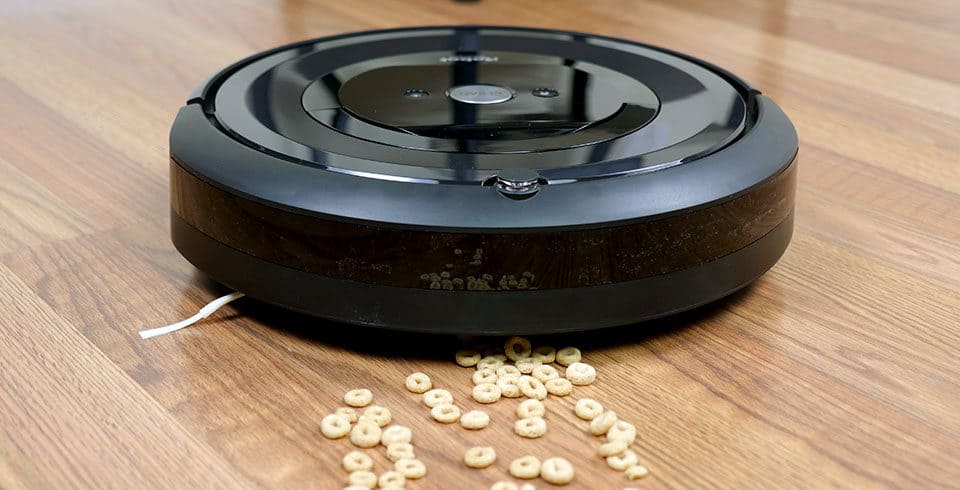
The main things you’re giving up by going with the e5 over the i / S-series is digital mapping, self empty dust bin, and recharge and resume. These features are not available on the Roomba e5.
RELATED: Want to see how the e5 compares to the Roomba i7? See our full Roomba e5 vs. i7 vs i7+ here.
- Dimensions: 13.3″ diameter x 3.6″ H
- Run Time: ~90 minutes
- Weight: 7.2 pounds
Pros
- Still has a long 90-minute run time
- Excellent cleaning performance on all floor types
- Wifi connectivity for easy scheduled cycles, voice control, or control while on-the-go
Cons
- No digital mapping and worse navigation compared to i and S-series Roomba
- No self empty dust bin
- No Recharge & Resume feature
Value Price With Good Performance, No mapping

Roomba e5
In my view, this is one the best value robots currently on the market. Its performance in our cleaning tests was identical to what we saw on the S9+, i7+, and i3+. You miss out on digital mapping and a self-emptying dust bin, but in terms of cleaning performance you are covered. Oh and the price point is incredibly reasonable.
Shark ION R85 (RV850) / RV871
UPDATE: This model appears to slowly being phased out and replaced with the Shark ION RV871. Here are some quick details on the change.
The Shark R85 is a solid representation of the build quality and performance of the Shark 800 series, hitting a nice balance between price and performance.
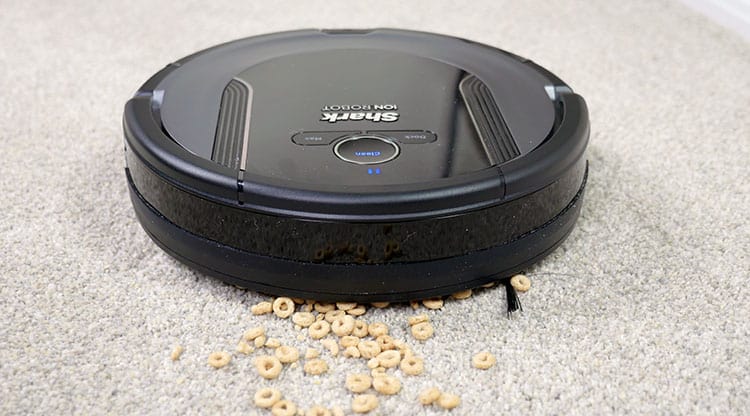
It has a 90-minute run time, up to 30 minutes longer than the run time on the ION R750.
Additionally, it creates 3 times the suction on Max mode (over the R75). The R85 offers scheduled cleaning cycles and voice control via Amazon Alexa or Google Assistant to help make it easier to start, stop, and schedule cleaning cycles.
- Dimensions: 12.8″ diameter x. 3.4″ H
- Run Time: ~90 minutes
- Weight: 6.6 pounds
Pros
- Extra-long 90-minute run time
- Extra-large dust bin capacity over the R85 (0.6 liters on the R85 – that’s 30% more than the 0.4L max capacity of the R75 and even about 15% more capacity over the Roomba e5 max capacity of 0.5L)
- Comes with a handheld vacuum option, if you opt for the S87 model
Cons
- No digital keep out zones. You must use the physical boundary tape on the floor.
- Struggled with thicker carpet and finer debris types during our cleaning tests
Digital Mapping & Xl dust Bin
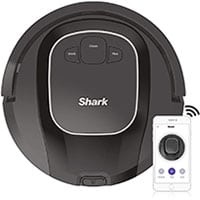
Shark ION RV871
The Shark RV871 has essentially become the new replacement to the ION RV850. It has many of the same features including large dust bin capacity and wifi-connectivity.
Roomba 690 / 692 / 694
The Roomba 690 (sold as Roomba 692 / 694) has been a staple of Roomba’s budget lineup for several years. The 690 has wifi connectivity, allowing you to start, stop, or schedule cleaning cycles from your smartphone.
For navigation, it uses infrared light to detect dirt and obstacles as it cleans. Unlike more advanced models, the 690 does not have memory mapping.
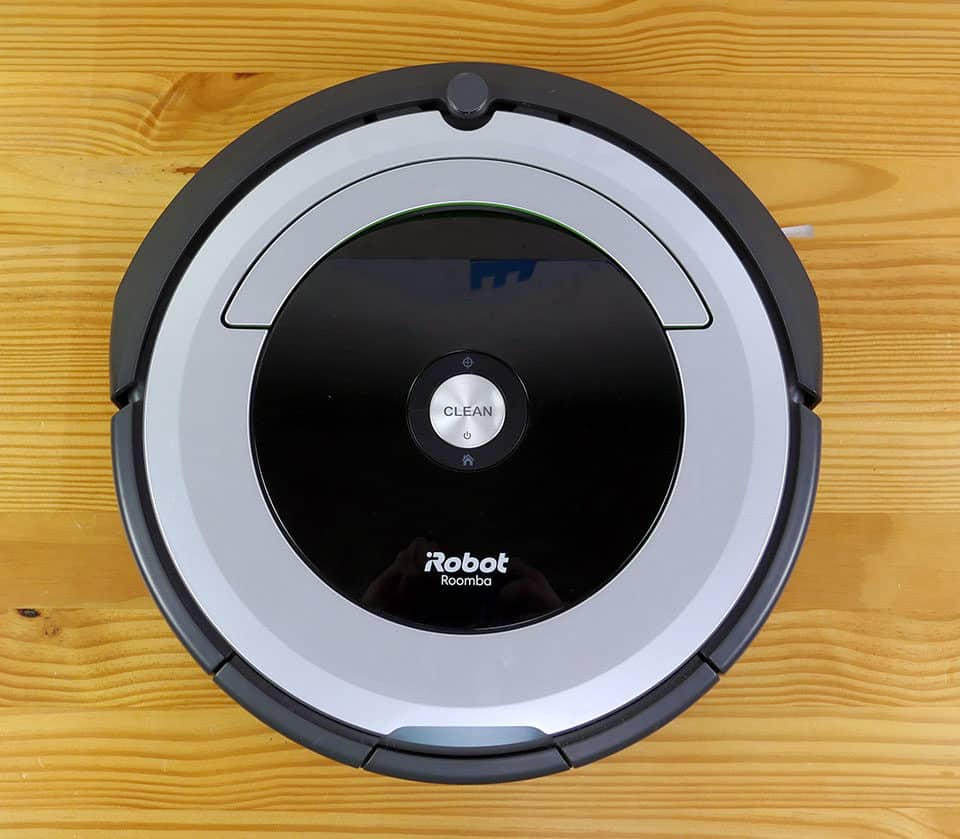
The 690 also does not have a HEPA filter, but it does have a fine-particulate filter. The 690 models also uses a bristle-style brushroll, similar to the Shark ION series.
- Dimensions: 13″ diameter x 3.6 H
- Run Time: ~90 minutes
- Weight: 7.8 pounds
Pros
- Wifi-connectivity allows you to control the vacuum with your smartphone or voice control.
- Long 90 minute run time, considering the lower price.
Cons
- Lacks the advanced filtration of newer model Roombas.
- Older bristle-style brushroll is prone to tangle more.
- More difficult to find, not as widely available at as many retailers.
Roomba 675
The Roomba 675 robot is almost identical to the Roomba 690 / 692 / 694 besides the fact that it doesn’t include a virtual wall and is slightly larger, about 0.5″ wider and 0.1″ shorter.
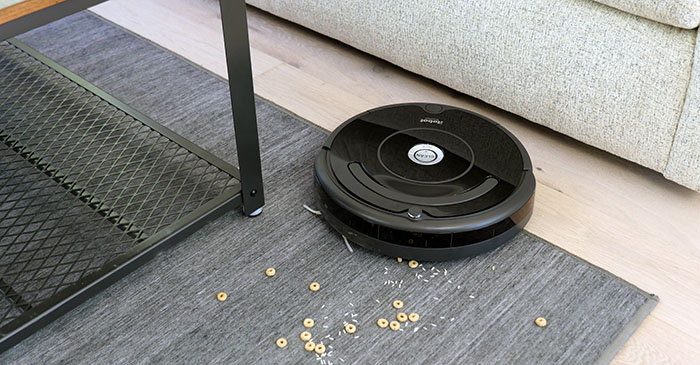
- Dimensions: 13.4″ diameter x 3.5 H
- Run Time: ~90 minutes
- Weight: 7.8 pounds
Pros
- Does basically everything the Roomba 690 does, just doesn’t include the virtual wall barrier, but you save a few bucks because of that.
- A great budget / value robot that still includes wifi connectivity for smartphone control
- 90 minute run time
Cons
- Like the Roomba 690, can struggle to remove fine debris from carpet.
Roomba 960
The Roomba 960 robot is one step down from the Roomba 980 model. It includes many of the same features like wifi-connectivity, scheduled cleanings, filtration, and the advanced brushroll. The upgraded brushroll is better at preventing tangles (vs. the more basic 600 series brush)

The 960 model also has the ability to generate cleaning reports, available on your smartphone via the iRobot Home app.
One difference between the Roomba 960 vs. the 980 is the power boost bonus that the 980 model has. This allows the 980 to offer better cleaning performance on thick carpets.
That said, the difference during our cleaning tests was not dramatic on high pile carpet. See our Roomba 960 vs. 980 comparison for more
- Dimensions: 13.8″ diameter x 3.6″ H
- Run Time: ~120 minutes
- Weight: 8.6 pounds
Pros
- Extended 75-minute run time is sufficient for most cleaning cycles.
- Recharge and Resume technology allows Roomba to keep cleaning until the job is done.
- Low annual maintenance costs help to offset the relatively high initial cost.
Cons
- More expensive than many Shark robots, but also comes with more features.
- Does not include the “Power Boost” for cleaning high-pile carpet, like the Roomba 980 model.
Shark ION R72 (RV720 / ION 720) / AV751
UPDATE: This model is seems to be slowly being phased out and replaced with the Shark ION AV751. Here are some quick details on the change.
The Shark ION RV720 (ak: R72) is the younger sibling to the ION R75 model. Similar to the R75, the ION R72 also is self-charging, can run scheduled cleanings, and includes a filter. It also cleans with a single central brushroll and two spinning side brushes.
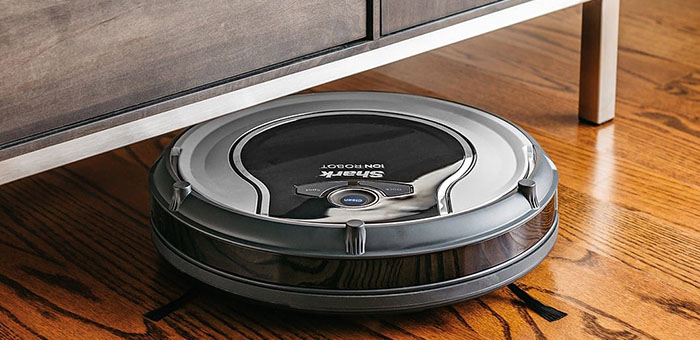
The main difference between these two model is that the ION R72 does not have wifi-connectivity. Instead of controlling it with your smartphone, the R72 comes with a remote control for wireless control.
- Dimensions: 12.6″ diameter x 2.6″ H
- Run Time: ~60 minutes
- Weight: 5.5 pounds
Pros
- Lower price tag than the ION R75, without sacrificing run time.
- Includes remote for wireless control.
- Lightweight body style with low profile.
Cons
- Does not include wifi-connectivity or a pairing app on your smartphone.
- It’s not as widely available, so pricing can be weird / more expensive. In many cases you’re just better off going with the RV871.
Value Price With Good performance, No Mapping

Shark ION AV751
The Shark ION AV751 is a a newer version robot in the Shark 700 Series, which offers a longer run time, WiFi-connectivity, and digital mapping.
If you’d like to see a deep dive on all of the vacuums shark offers see our complete Best Shark vacuums guide here.
Roomba 614
The Roomba 614 is the most basic vacuum model that is currently offered by Roomba. Coming in at an affordable price, this model has a simple design for easy usability and no-fuss add-ons. It still has a run time of 60 minutes.
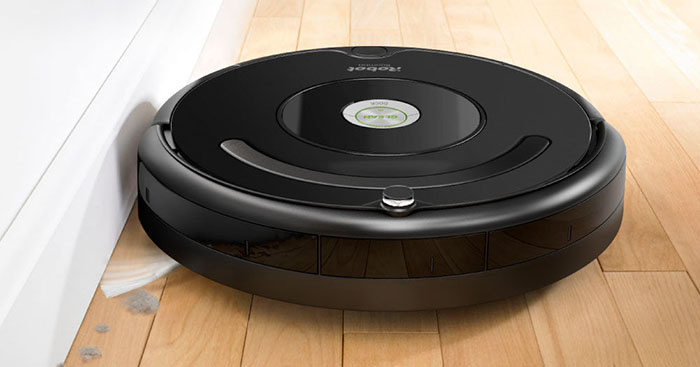
What it lacks is HEPA filtration and wifi connectivity. That being said, for an inexpensive Roomba that cleans where it is put, the 614 may still be a great option.
- Dimensions: 13.4″ diameter x 3.7 H
- Run Time: ~60 minutes
- Weight: 7.5 pounds
Pros
- One of the least expensive robot modes from both Shark & Roomba
- Wifi-connectivity allows you to control the vacuum with your smartphone or voice control.
- Relatively long 60-minute run time, considering the lower price.
Cons
- Lacks the HEPA filtration of newer model Roombas.
- Older bristle-style brushroll is prone to tangle more.
Wonder how Roomba compares to other robot vacuums on the market? Check out our Neato vs. Roomba, iLife vs Roomba, and Bobsweep vs Roomba comparison battles.
Shark ION R75 (RV750 / ION 750)
NOTE – While the R75 is still available at some retailers, it seems to be in the process of being discontinued. As such, you’re probably better off just getting the Shark ION RV871.
The Shark ION R75 is self-charging and comes with Wifi-connectivity—allowing you to start, stop, or schedule a cleaning cycle remotely from your smartphone at any time.
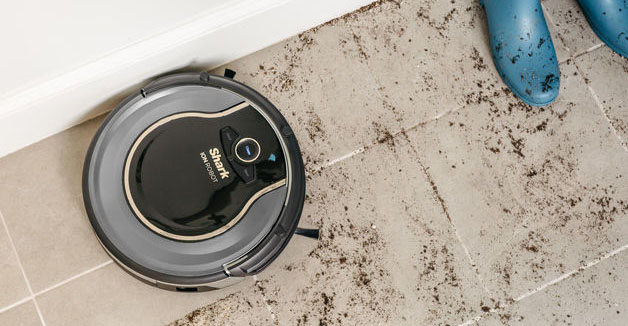
The wifi signal also allows for voice control via Amazon Alexa. The Shark R75 and Shark ION R72 use the same battery and both offer a 60-minute run time.
- Dimensions: 12.6″ diameter x. 2.6″ H
- Run Time: ~60 minutes
- Weight: 5.5 pounds
Pros
- Lightweight body is about 40% lighter than the Roomba models.
- Lower price tag than some of the higher-end models.
- The 60-minute run time provides sufficient time for cleaning most areas.
Cons
- The “BotBoundary” strips are more difficult to use than Roomba’s virtual wall and digital barriers.
- Not able to generate as much suction as the R85
- Seems like it’s in the process of discontinuation
Roomba 980 / 981
The Roomba 980 (aka Roomba 981) still offers solid cleaning performance and a 120-minute run time with Recharge & Resume capabilities.
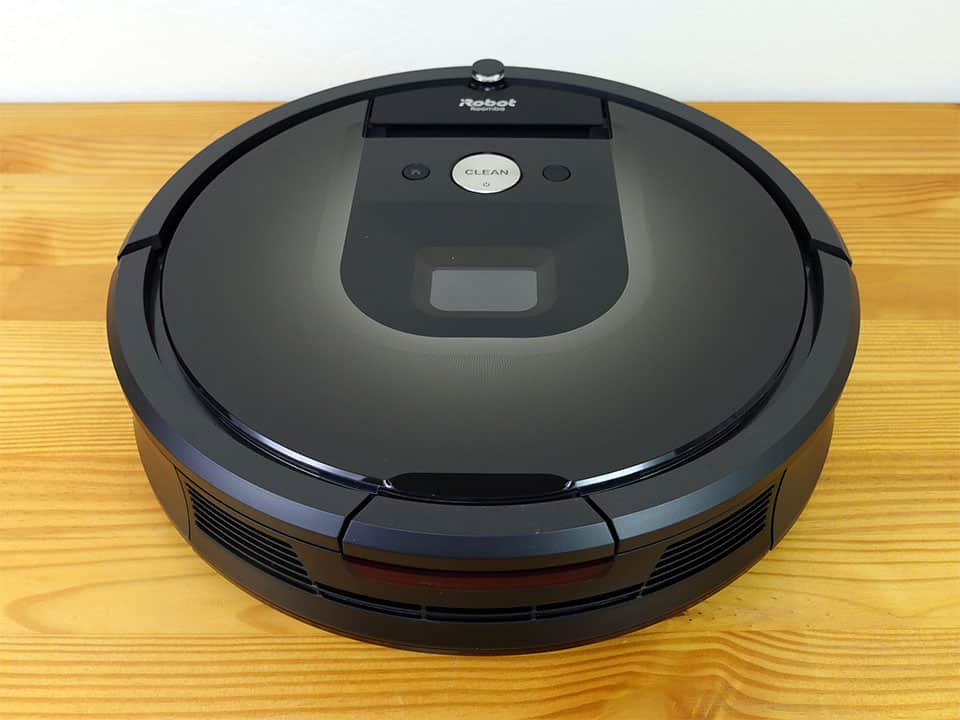
The 980 offers wifi-connectivity, filtration, and includes two virtual wall barriers.
Unlike the Shark ION BotBoundaries, which require physical strips to block off areas, the Roomba virtual wall barriers can protect up to 10′ linear path (like a doorway or hall) as well as a 4′ diameter by placing a boundary in one location.
- Dimensions: 13.9″ diameter x 3.6″ H
- Run Time: ~120 minutes
- Weight: 8.7 pounds
Pros
- Extended run time is longer than Sharks, which caps off at ~90 minutes with the RV871 and AV751
- Wifi-connectivity offers control with your smartphone or voice control with Amazon Alexa
- Excellent cleaning performance on all floor types.
Cons
- Not as widely available. Depending on the price you may be better off with an i3+ EVO or i7+.
- During our cleaning test, this vacuum was a bit loud on low carpet and hardwoods.
Roomba 890
NOTE – Like the 980, the Roomba 890 isn’t as widely available. It’s also weirdly priced at many retailers. In almost all cases it just makes more sense to get a newer Roomba e5 or i3+ EVO instead (same or less expensive, for better performance).
The Roomba 890 has the same run time as the Shark ION 750 and 720 models (60 minutes). It features a centrally located “Clean” button on the face of the vacuum with a handle, and dust bin release latch.
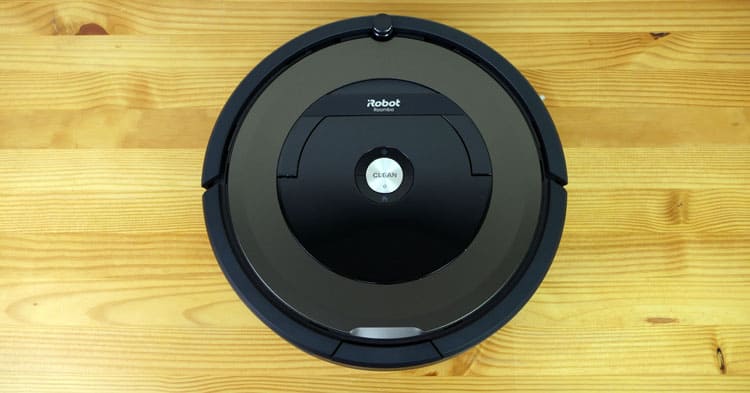
On the underside the 890 uses one spinning side brush for cleaning corners and tight spots, along with dual rubberized brushrolls for collecting debris, without the tangles.
The 890 has wifi connectivity which allows this vacuum to be controlled with your smartphone. You can start, stop, or schedule cleaning for up to a week. This model includes one virtual barrier.
- Dimensions: 13.9″ diameter x 3.6 H
- Run Time: ~60 minutes
- Weight: 8.4 pounds
Pros
- Lower price tag compared to the 900 series Roomba models.
- Wifi connectivity makes it easy to stop, start, or schedule cleaning cycles.
- Dual brushrolls prevent more tangles over the 600 series Roombas.
Cons
- More expensive than the Shark ION series robot vacuums.
- Struggles a bit with fine debris on high pile carpet.
If you’re interested in how Roomba compares to other robots check out some of our comparisons here.
Should you a Shark or Roomba?
Both of these manufacturers produce a quality robot vacuum and depending on your needs, they may be met by any one of these models listed above.
The best way to choose between Shark vs. Roomba is to ask yourself a series of questions about your needs and desires.
First things first, what is your budget?
Most Shark robots fall into the budget / moderately priced category, with only the Shark IQ rising to the mid-range price.
Roomba spans a wider range of pricing, from budget to extremely expensive.
If you want a budget robot you’ll be looking at:
If you want something in the mid-range price tier you’ll be considering:
- Roomba e5
- Roomba i3 EVO (i3+ is self-emptying, i3 standard is not)
- Shark IQ (self-emptying)
- Shark AI Ultra (self-emptying)
And lastly, if you want the most high-end options then you’ll be in the most expensive tier:
- Roomba i3+ EVO (self-emptying)
- Roomba i7+ (self-emptying)
- Roomba j7+ / Combo j7+ (self-emptying + mopping)
- Roomba S9+ (self-emptying)
Second, what features are most important to you?
Just want the best robot you can get without spending too much money? You won’t want to miss these models:
If you’re looking for a robot that strikes a balance between performance and price we recommend:
Are you looking for the smartest robot vacuums on the market? Something you can set up and then forget about, with the confidence to know that it will be able to navigate, clean, and dock by itself?
If this sounds like you, it’s hard to beat the i Series and S Series Roombas.
- Roomba S9+ / Roomba S9
- Roomba Combo j7+ / Roomba j7+ / Roomba j7
- Roomba i7 / Roomba i7+
- Roomba i3 EVO / Roomba i3+ EVO
With added features like Recharge & Resume, Digital Cleaning Reports, and Memory Mapping, and incredible suction, these models are top-of-the-line for high-end robot vacuums.
That’s A Wrap, Folks!
Well, that’s it for this Shark vs. Roomba guide. We hope you found it helpful!
If you’re still having trouble deciding the robot vacuum that’s best for you see our full list of robot vacuum reviews here or check out our guide on the best robot vacuums.
Need even more help? Use our contact form below to ask any questions. We do our best to answer within 24 hours.

